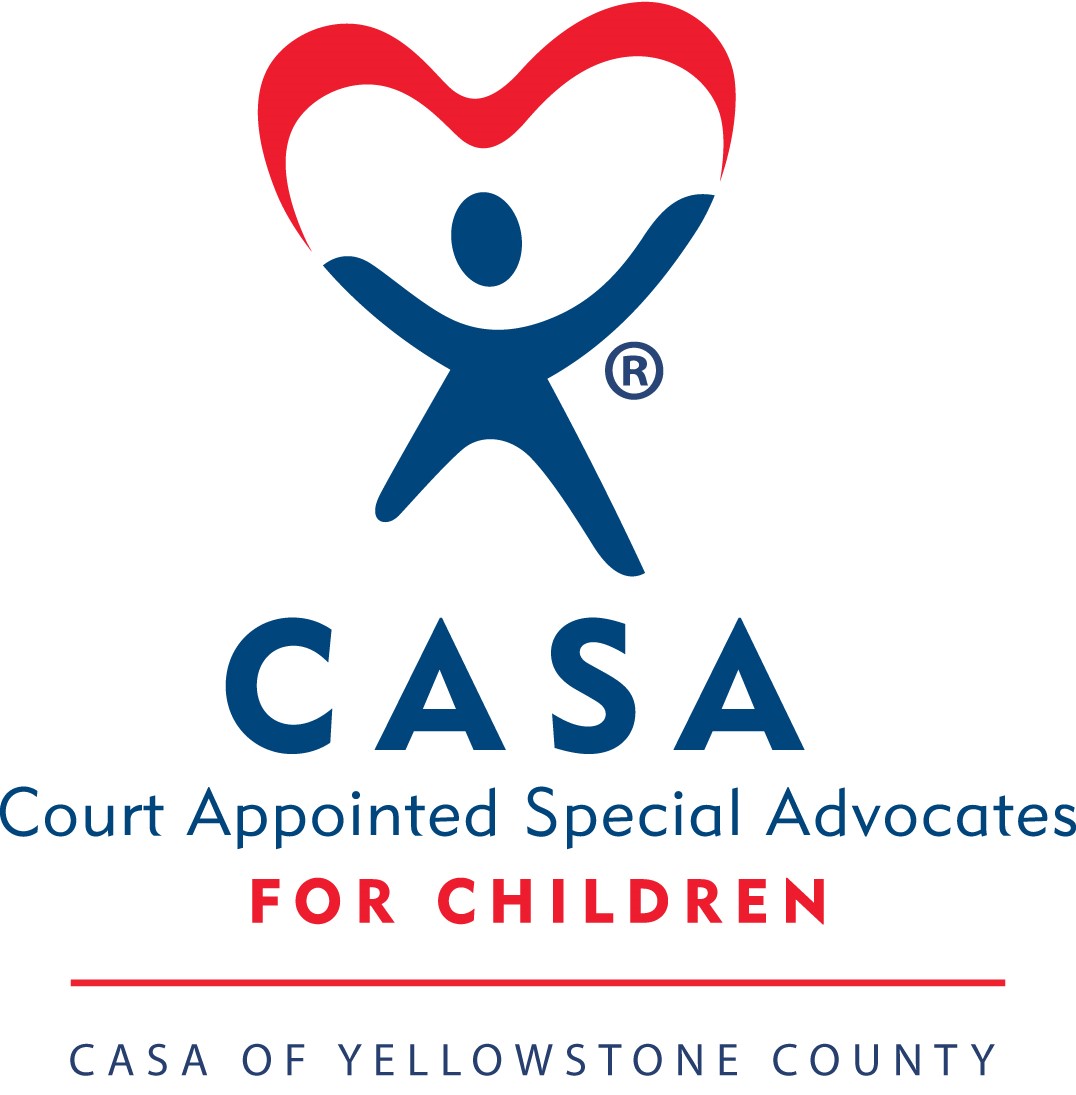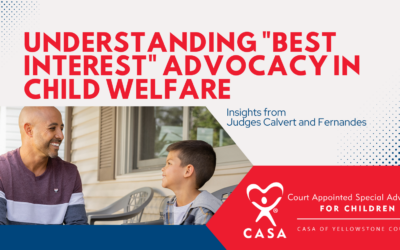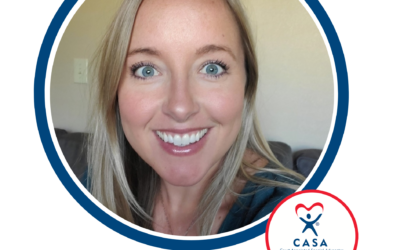July 2022 marks my fifth anniversary of working with CASA of Yellowstone County. While that’s nowhere near the dedication of some of our advocates who have been serving kids since before I even heard of CASA (I’m looking at you, 10-year CASA veterans!), it is truly an honor to support advocates who volunteer their time, energy, and heart to serve the kids in our community who need them most.

Jess Bailey
That being said, five years of any endeavor will include peaks and valleys. While I fully intend to keep doing this work for many years to come, there are days when this job literally gives me grey hair. (Or maybe that’s just what happens when you age five years, two of which are pandemic years. Scientific studies are pending.) Because I’m a nerd, and because it has been a hot leadership topic of late, I’ve been thinking a lot about burnout recently.
The first time I ever remember noticing the term “burnout” was quite a few years ago, when a peer said she was “burned out on paperwork” and switched careers from a medical office to a bakery. Even then, her comment struck me as ringing slightly hollow. I thought, “Surely the paperwork isn’t what’s really at the heart of what’s bothering you. And anyhow, isn’t that what you signed up for?”
While I didn’t have the kind of relationship with this person that would have allowed for a frank conversation in which I could voice my thoughts, those impressions have stuck with me over the years. Since then, the term “burnout” has evolved from less of a generalized feeling of being sick of work and wanting a vacation to a full-fledged occupational hazard recognized by the World Health Organization.[i]
When we define things, we can more easily talk about them. And when we can talk about things, we can more easily tackle them. I have seen advocates and coworkers fall victim to so much burnout that they left the field entirely, and my hope with today’s post is to head off burnout before we flame out. As with any occupational hazard, we will increase our effectiveness and longevity if we pay attention to our circumstances from day to day—and sometimes even from moment to moment—and take concrete steps to take off-ramps before we hit full burnout.

Karolina Grabowska
What It Is
Burnout can be identified when problems related to employment or unemployment fall into one or more of three buckets:[ii]
- Exhaustion. This exhaustion can be physical (for example, lacking the physical energy to get off the couch when you get home from work or advocacy), mental (lacking the brain power to get off the aforementioned couch), or emotional (hello again, couch. You’re just so cozy).
- Decreased sense of accomplishment or, on the flip side, a feeling of ineffectiveness. I’ve noticed this aspect of burnout creep into my work when one part of me recognizes that a permanent outcome for a child is a huge event, but I just don’t feel as excited about it as I once did. Another aspect of this particular burnout bucket can be found in a sense of futility, feeling like nothing we do to advocate for these kids will make a difference.
- Cynicism and detachment. Much like exhaustion, this detachment can be physical isolation (skipping CASA events and meetings) or emotional (distancing yourself from your CASA child and peer coordinator).
It’s important to recognize that, as with many things in this world, burnout is on a continuum. On any given day, we could be fresh as a daisy! Good to go! Not burned out in the least! Ready to take on the day! Mere hours later, we could be experiencing one of the burnout buckets but not the other two. And by the end of the day, every single burnout bucket could be filled to overflowing.[iii] That’s just life in this world. It’s important to notice in yourself how you are mentally, emotionally, and physically responding to your circumstances and, when you notice your bucket getting a little sludgy, take steps to empty it a bit.

Tara Winstead
Let’s Get Practical
It’s not realistic to wait until we’re fully burnt out in all spheres before we do anything about it. It’s not practical, and it will leave a lot of burned bridges behind us. I’d love to hear any tips readers have about preventing burnout. Here are some that I have come across lately:
- Mini-breaks. I mean mini. Super short. Breathing deeply between items on my to-do list or standing up and stretching for 10 seconds before I log onto that next video call can be just enough to reset, tell my brain I don’t have to be in a state of fight or flight, and get some oxygen going for the next hurdle.
- True rest. I have a dear friend who was coaching some members of our church recently on taking actual rest. She pointed out that for those whose primary vocation is physically active (construction workers, fitness instructors), rest would be mentally active (reading a book, doing a jigsaw puzzle, etc). For those whose primary vocation is mentally active (computer programmers, ahem–CASA staff), rest would be physically active (working out, gardening, etc). This true rest is different for everyone! For me, my happy places are hiking in the mountains, listening to live music, and reading in my hammock. For some of you, the mountains are just bear-infested, but you’d be up for going to a sporting event. Live music could be overrated, but you sure do love a meal at a nice restaurant. And reading could be boring, but you enjoy a good art film. Whatever true rest is for you, please, for the sake of your CASA and non-CASA relationships and longevity—take it! (Hint: This probably does not include several hours of Facebook or Insta scrolling.)
- Take the win. We often talk about small wins around the CASA office. Sometimes it can be cheesy, but these cases are marathons (or ultramarathons), not sprints. Even if it seems silly, take a moment and marinate on those good things that happen along the way. It will condition your brain to focus on the highlights and keep you going through the hard times.
- For the love, people, sleep. Take physical rest. I know you could stay up and do a little more research on your CASA child’s diagnosis, but just go to bed. I know you could get up early and send a few emails to your CASA child’s providers before the day gets going, but please don’t literally lose sleep over it. I’m a firm believer that “Get some sleep. You’ll feel better in the morning” is not just for five-year-olds.
As with so many of my blogs, I am writing from a place of learning instead of expertise. We are on this CASA road together, and I want us all to continue for quite some time to come. We can take small steps to fight burnout together, so let’s do this. Here’s to five more years!

Pixabay
[i] Sara Berg, MS. “WHO Adds Burnout to ICD-11. What It Means for Physicians.” July 23, 2019. American Medical Association. https://www.ama-assn.org/practice-management/physician-health/who-adds-burnout-icd-11-what-it-means-physicians
[ii] Britt Andreatta. “Science-Based Strategies for Thriving Through Change.” June 15, 2022. Association for Talent Development. https://www.td.org/atd-blog/science-based-strategies-for-thriving-through-change
[iii] Jennifer Moss. The Burnout Epidemic: The Rise of Chronic Stress and How We Can Fix It.” 2021. HBR Press.






